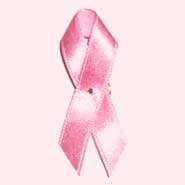|
 Kylie Minoques high-profile battle with breast cancer has raised concerns among younger women in Australia. Kylie Minoques high-profile battle with breast cancer has raised concerns among younger women in Australia.
The National Breast Cancer Centre says about 11,500 Australian women are diagnosed with breast cancer each year with only about 700 (6%) of these women are under 40.
Seventy-five per cent of women diagnosed are aged 50 years and over.
The most recent Australian data shows that over all stages of the disease about 80 per cent of women aged between 30 and 39 will be alive five years after diagnosis.
This compares with a five-year survival rate of about 85 per cent for women over 50. These rates differ because breast cancers in younger women are often larger and more aggressive.
The survival rates of many women with early breast cancer will be better than the overall rates given above because the earlier the cancer is detected, the better the rate of survival.
What is early breast cancer?
Early breast cancer means the cancer has not spread to other parts of the body.
What is involved in the treatment for early breast cancer?
The aim of treatment for early breast cancer is to remove the cancer from the breast and to destroy any cancer cells that may have spread to other parts of the body, but cannot be detected.
Every womans situation and breast cancer is different and treatment options will depend on the individuals situation.
Treatment for early breast cancer will usually involve surgery; this may involve breast conserving surgery, where only the tumour and a small area around it is removed, or mastectomy, where the whole breast is removed.
Radiation is usually given after breast conserving therapy and sometimes after mastectomy.
Evidence has shown that chemotherapy and hormone therapy may also be of particular benefit in the treatment of younger women with breast cancer.
What are some of the issues for younger women with breast cancer?
Younger women are likely to face particular issues because of their age and life stage.
Physical issues
Treatments such as chemotherapy and hormonal therapies can have side effects on ovarian function including menopausal symptoms or infertility. These effects may be permanent or temporary.
Psychosocial issues
Breast surgery, radiotherapy, hormonal therapy and chemotherapy may have a significant effect on how women feel about their sexuality and body image.
Younger women with breast cancer are also reported as having a higher risk for psychological distress, anxiety and depression.
Should women under 40 be having regular mammograms?
Regular screening mammograms are not recommended for women under 40.
Younger women have denser breasts than older women.
This means the effectiveness of the mammogram in finding breast cancer early is greatly reduced. Generally, breasts become less dense as women get older, particularly after menopause.
What can younger women do to find breast cancer early?
Its important that all women know the look and feel of their breasts.
Getting to know what is normal for them will help them to recognise any new or unusual breast changes. Breast awareness means looking at your breasts and feeling them regularly, maybe while showering or dressing.
There is no particular method that should be used and it can be done at any time of the month.
Things to look out for include: - A lump or lumpiness
- Any change in the shape or appearance of the breast such as dimpling or redness
- An area that feels different to the rest
- A discharge from the nipple
- Any change in the shape or appearance of the nipple such as pulling in or scaliness
- Pain
Finding breast cancer early means women have more treatment options and a\ better chance of survival.
Key facts about breast cancer in Australia - One in 11 Australian women will be diagnosed with breast cancer before the age of 75.
- Breast cancer is the most common cause of cancer-related death in women in Australia.
- A total of 2594 women died from breast cancer in Australia in 2001 (last available national figures).
- In Australia in 2001 a total of 11,791 women and 95 men were diagnosed with breast cancer.
- The risk of breast cancer increases with age. Almost 24 per cent of new breast cancer cases diagnosed in 2001 were in women aged 20-49; 49 per cent in women aged 50-69; and 27 per cent in women aged 70 and over.
- From 1991 to 2001, the breast cancer death rate declined by an average of 2.2 per cent per year.
|